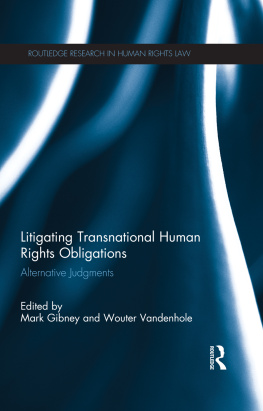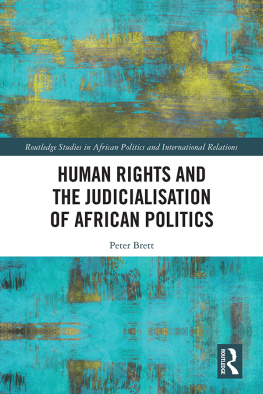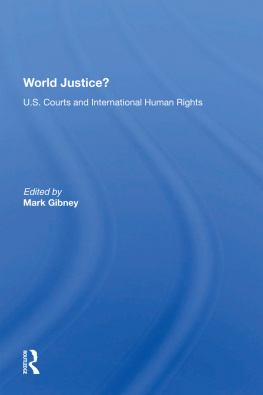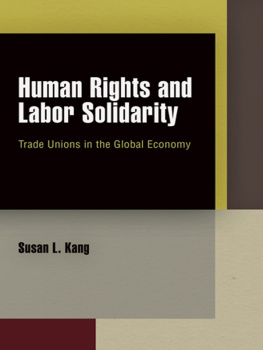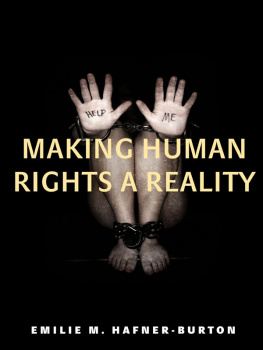
Litigating Transnational Human Rights Obligations
Human rights have traditionally been framed in a vertical perspective with the duties of States confined to their own citizens or residents. Obligations beyond this territorial space have been viewed as either being absent or minimalistic at best. However, the territorial paradigm has now been seriously challenged in recent years in part because of the increasing awareness of the ability of States and other actors to impact human rights far from home both positively and negatively. In response to this awareness various legal principles have come into existence setting out some transnational human rights obligations of varying degrees. However, notwithstanding these initiatives, judicial institutions and adjudicating bodies continue to show an enormous hesitancy in moving beyond a territorial reading of international human rights law.
This book addresses the issue in an innovative and challenging way by crafting legally sound hypothetical judgments from a number of adjudicatory fora. The judgments are based on real world situations where extraterritorial or transnational issues have emerged, and draw on existing international human rights law, albeit a progressive interpretation of this law. The book shows that there are a number of judicial and quasi-judicial systems where transnational human rights claims can, and should be enforced. These include: the World Trade Organization; the International Court of Justice; the regional human rights monitoring bodies; domestic courts; and the UN treaty bodies. Each hypothetical judgment is accompanied by detailed commentary placing it in context in order to show how international human rights law can address issues of a transnational character.
The book will be of interest to human rights scholars and lawyers, practitioners, activists and aid officials.
Mark Gibney is the Belk Distinguished Professor at University of North Carolina Asheville. Since 1984, Gibney has directed the Political Terror Scale (PTS), which measures levels of physical integrity violations in more than 185 countries (politicalterrorscale.org).
Wouter Vandenhole holds the UNICEF Chair in Childrens Rights at the Faculty of Law of the University of Antwerp (Belgium) and is the Co-Director of the Law and Development Research Group.
Routledge Research in Human Rights Law
Available titles in this series include:
The Right to Development in International Law
The Case of Pakistan
Khurshid Iqbal
Global Health and Human Rights
Legal and Philosophical Perspectives
John Harrington and Maria Stuttaford
The Right to Religious Freedom in International Law
Between Group Rights and Individual Rights
Anat Scolnicov
Emerging Areas of Human Rights in the 21st Century
The Role of the Universal Declaration of Human Rights
Marco Odello and Sofia Cavandoli
The Human Right to Water and its Application in the Occupied Palestinian Territories
Amanda Cahill
International Human Rights Law and Domestic Violence
The Effectiveness of International Human Rights Law
Ronagh McQuigg
Human Rights in the Asia-Pacific Region
Towards Institution Building
Hitoshi Nasu and Ben Saul
Human Rights Monitoring Mechanisms of the Council of Europe
Gauthier de Beco
The Positive Obligations of the State under the European Convention of Human Rights
Dimitris Xenos
Vindicating Socio-Economic Rights
International Standards and Comparative Experiences
Paul OConnell
The EU as a Global Player in Human Rights?
Jan Wetzel
Regulating Corporate Human Rights Violations
Humanizing Business
Surya Deva
The UN Committee on Economic, Social and Cultural Rights
The Law, Process and Practice
Marco Odello and Francesco Seatzu
State Security Regimes and the Right to Freedom of Religion and Belief
Changes in Europe Since 2001
Karen Murphy
The European Court of Human Rights in the Post-Cold War Era
Universality in Transition
James A. Sweeney
The United Nations Human Rights Council
A Critique and Early Assessment
Rosa Freedman
Children and International Human Rights Law
The Right of the Child to be Heard
Aisling Parkes
Litigating Transnational Human Rights Obligations
Alternative Judgments
Mark Gibney and Wouter Vandenhole
Forthcoming titles in this series include:
Jurisdiction, Immunity and Transnational Human Rights Litigation
Xiaodong Yang
Litigating Transnational Human Rights Obligations
Alternative Judgments
Edited by Mark Gibney and Wouter Vandenhole

The European Science Foundation (ESF) provides a platform for its Member Organisations to advance science and explore new directions for research at the European level. Established in 1974 as an independent non-governmental organisation, the ESF currently serves 78 Member Organisations across 30 countries.

First published 2014
by Routledge
2 Park Square, Milton Park, Abingdon, Oxon, OX14 4RN
and by Routledge
711 Third Avenue, New York, NY 10017
Routledge is an imprint of the Taylor & Francis Group, an informa business
2014 Mark Gibney and Wouter Vandenhole
The right of Mark Gibney and Wouter Vandenhole to be identified as editors of this work has been asserted by them in accordance with sections 77 and 78 of the Copyright, Designs and Patents Act 1988.
All rights reserved. No part of this book may be reprinted or reproduced or utilised in any form or by any electronic, mechanical, or other means, now known or hereafter invented, including photocopying and recording, or in any information storage or retrieval system, without permission in writing from the publishers.
Trademark notice: Product or corporate names may be trademarks or registered trademarks, and are used only for identification and explanation without intent to infringe.
British Library Cataloguing in Publication Data
A catalogue record for this book is available from the British Library
Library of Congress Cataloging-in-Publication Data
Litigating transnational human rights obligations : alternative judgements / Mark Gibney and Wouter Vandenhole.
pages cm. (Routledge Research in Human Rights Law)
Includes bibliographical references and index.
ISBN 978-0-415-85811-3 (hbk) ISBN 978-0-203-79747-1 (ebk) 1. Human rights.
I. Vandenhole, Wouter. II. Title.
K3240.G533 2014
342.085dc23
2013020572
ISBN: 978-0-415-85811-3 (hbk)
ISBN: 978-0-203-79747-1 (ebk)
Typeset in ITC New Baskerville
by Cenveo Publisher Services
Contents
WOUTER VANDENHOLE AND MARK GIBNEY
PART I
International Economic Governance Bodies
CLAIRE BUGGENHOUDT
ALEXIA HERWIG
JOSS SAUNDERS
PART II
Global (Human Rights) Monitoring Bodies
GAMZE ERDEM TKELLI
RACHEL HAMMONDS AND GORIK OOMS
Next page
